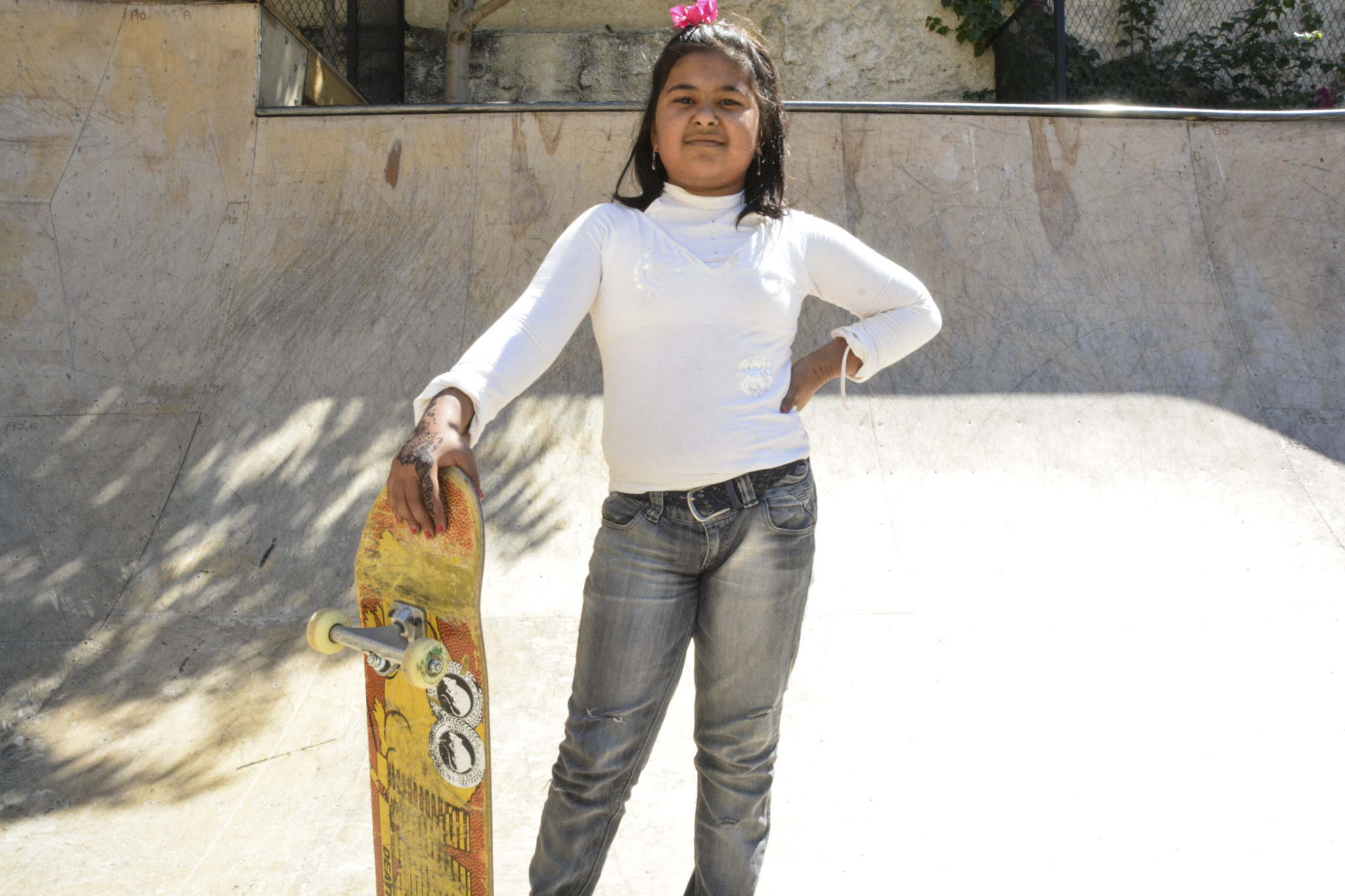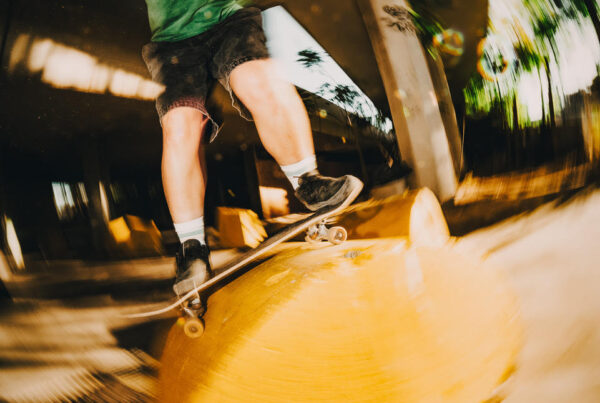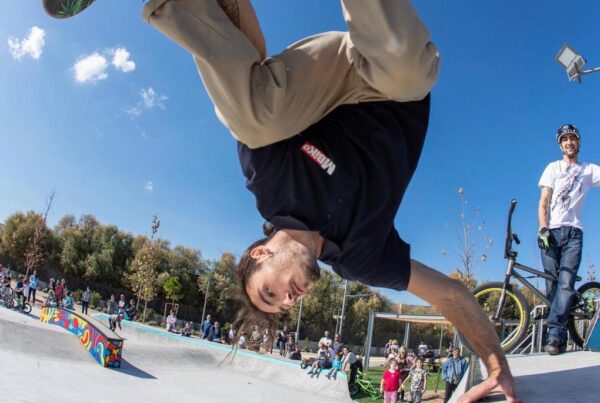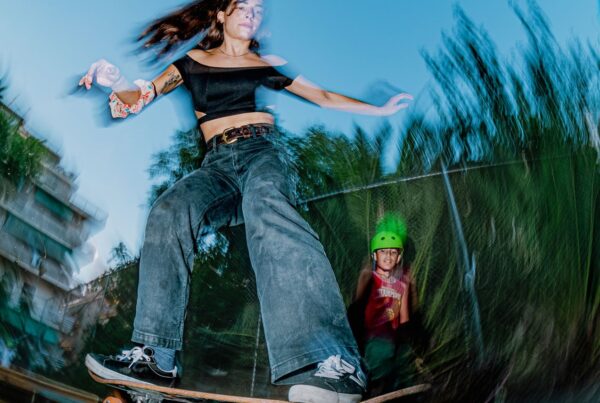Many of the young people we teach have experienced prolonged periods of trauma and stress, which can have a lasting effect on behaviour and cause severe changes in the developing brain. Current research shows that engaging in regular physical activity can stimulate brain function, which, in turn, helps to regulate stress and improve mental health. Skateboarding in particular can be highly soothing due to its vast sensory stimuli and social nature; most importantly, in how it teaches tenacity and resilience.
The situation here in Greece is volatile and constantly changing. The EU-Turkey deal, which was passed in March 2016 to control the crossing of refugees and migrants from Turkey into Europe, has led to severe overcrowding and increased desperation on the Greek islands. Last autumn, The Guardian and other large media outlets reported on the ‘inhumane’ living conditions inside Moria Camp on Lesvos island. As a direct response to this sudden exposure, thousands of refugees and asylum seekers were relocated to camps on the mainland of Greece. This did not solve any issues, but rather just shifted the problem down the line. Most camps on the mainland are over-capacity and severely isolated—camps such as Malakasa and Oinofyta are over an hour’s drive from Athens, with extremely poor transport links. This means that the people living there have little to no opportunities to engage with life outside of the camp or access vital services. Today, many people who were relocated inland are still living in tents crammed together with multiple other families.
The children living in these isolated camps are faced with a tense atmosphere compounded with a lack of stimulation, exercise, and education. This contributes hugely to rises in challenging behaviour, intolerance, fighting, racism and self-harm. These conditions often perpetuate poor mental health and worsen the effects of past traumatic events. Across all of our skateboarding workshops, we teach girls and boys from diverse backgrounds and many different age groups, in locations all around the centre of Athens and in camps far away from the city. Over the past two years we have taught around 500 people, mostly under the age of 16, and I can confidently tell you that the only correlation linked to challenging behaviour is that it is significantly higher in the camps that are isolated from the city. These are observations we have seen time and again during our experience teaching here in Athens.

Within these circumstances, it is no wonder the Médecins Sans Frontieres declared a ‘mental health emergency’ in their most recent report, referring to the people living in the camps on Greek islands.
As I outlined in the previous article, ‘Can skateboarding regularly help to improve the long-term effects of trauma and stress?‘—once someone has experienced a traumatic event or endured periods of high stress, their internal coping mechanisms are at an absolute low. This leaves their bodies in a state of almost constant shock or arousal, which significantly decreases their capacity to deal with any challenging situation, or one which is perceived as a threat to their safety. Thus, living in an overcrowded camp can be extremely detrimental for individual well-being and, as the MSF report outlines, puts people at a high risk of developing severe mental health issues.

There are three main domains of well-being, which I will define here as environmental, psychological, and subjective. Environmental factors include a person’s living circumstances, as well as physical and social activity. Psychological well-being includes personal growth, positive relationships and life purpose. Subjective well-being is affected by the emotions you experience internally—pleasure, joy, satisfaction, mood and feelings. Subjective well-being is very much a result of environmental and psychological factors. It is thought that overall well-being is achieved when these three domains are being collectively satisfied. By encouraging young people to engage in regular physical activity, one that is as socially and personally rewarding as skateboarding, we can start to change the environmental elements that significantly improve the psychological and subjective aspects of well-being.
Predetermined factors—such as genetics, living conditions and early life experiences—play a massive role in one’s mental health, brain development and maturation. However, in recent years much research has been undertaken following the discovery of neuroplasticity to explore how these predetermined behaviours and patterns in the brain can actually be rewritten. The most intriguing part of this research for us, as skate coaches and youth workers, is the increasing evidence showing that physical activity within a social environment can be one of the most effective ways to reduce stress and strengthen resilience.
Aside from the physical benefits regular participation can bring, skateboarding workshops provide the opportunity to learn a gratifying skill in a supportive environment—teaching the value of cooperation, respect for others, cheering each other on, and the importance of persistence after failure. Trying something again and again until you succeed. One of the nicest things we often see in our workshops is when the more experienced skaters gain the confidence to teach the new-comers. A young girl teaching a much older boy, a Syrian person teaching an Afghan person, an Afghan person teaching a Greek person, a child teaching their mother—skateboarding allows people to learn from each other. There are no rules or structures, no right or wrong way of doing it. And this is incredibly freeing. You learn for your own self, but in doing that you become part of a collective, and belongingness is especially important for teenagers and vulnerable kids.
For the next article in this series, I will further explore how skateboarding regularly can be a perfect activity for instigating positive changes within the environmental and psychological domains of well-being. This in turn can result in an improved sense of self-fulfilment, joy and happiness—boosting nerve growth and plasticity in the regions of the brain responsible for regulating emotions, stimulating communication and learning new skills.
You can read the previous article in this series here: Can skateboarding regularly help to improve the long-term effects of trauma and stress?
Words: Ruby Mateja
Photographs: Futuro Berg







